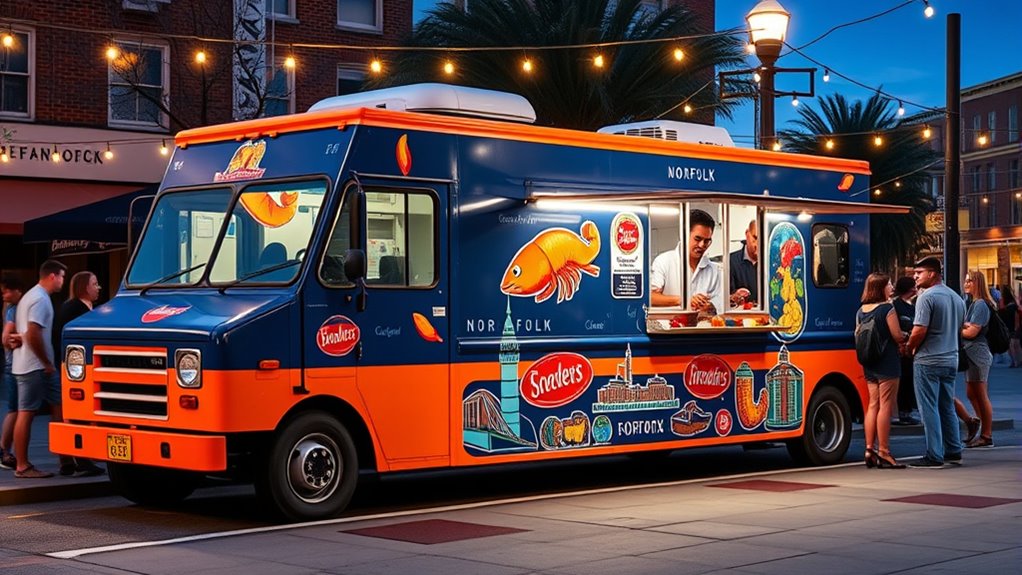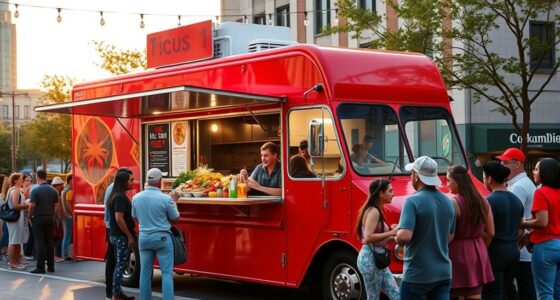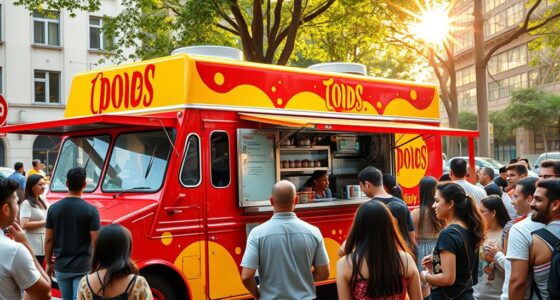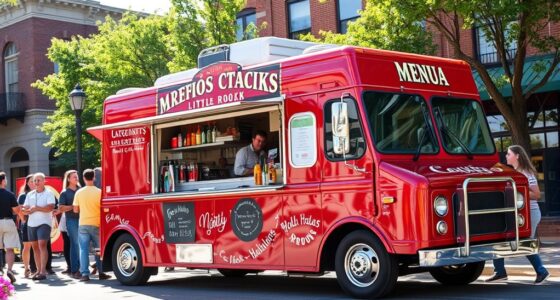To start a food truck in Norfolk, VA, you need to understand local regulations and obtain necessary permits through the city’s online system, ensuring you meet health and safety standards. Focus on designing a menu that highlights Norfolk’s regional flavors, and plan your budget carefully, including vehicle costs, insurance, and permits. Engaging with local events and using social media can boost your visibility. Keep exploring to discover detailed steps for launching your successful Norfolk food truck business.
Key Takeaways
- Complete the online permit application through Norfolk’s official website and gather sanitation documentation.
- Choose a suitable vehicle, explore shared kitchen options, and create a detailed business plan.
- Develop a menu featuring local ingredients and incorporate Norfolk-specific flavors to attract customers.
- Participate in local food truck events, festivals, and community collaborations to boost visibility.
- Utilize social media with high-quality photos, hashtags, and engagement to build a loyal customer base.
Food Truck Popularity in Norfolk

Have you noticed how food trucks have become a vibrant part of Norfolk’s culinary scene? The popularity of food trucks here reflects current food truck trends, which focus on fresh, innovative offerings and community engagement. Norfolk’s diverse population fuels cuisine diversity, making the city an ideal spot for a variety of flavors, from gourmet tacos to vegan desserts. These mobile eateries attract locals and visitors alike, creating a dynamic atmosphere that’s constantly evolving. As more people seek unique, affordable dining options, food trucks continue to grow in prominence. This surge in interest shows Norfolk’s openness to culinary experimentation and cultural exchange. Additionally, website policies such as privacy and data management practices are important considerations for both operators and customers. If you’re considering starting a food truck, you’re stepping into a thriving, diverse market enthusiastic for new tastes.
Understanding Local Requirements

To get started, you’ll need to complete the online permit application process and gather all necessary sanitation documentation to meet health standards. It’s also important to familiarize yourself with designated street parking zones to guarantee compliance. Understanding these local requirements helps you avoid delays and set your food truck up for success in Norfolk. Additionally, researching juice cleansing and detox options can support your overall health and energy levels as you launch your business.
Online Permit Application Process
Finding your way through Norfolk’s online permit application process is a crucial step in starting your food truck business. First, visit the city’s official website where you’ll find the online permit portal. The application process is straightforward: you’ll need to create an account, complete the application form, and upload required documents such as proof of insurance and vehicle details. Make sure to review all local requirements beforehand to guarantee your online permit application aligns with Norfolk’s regulations. Pay the applicable fees through the online system, then submit your application. Afterward, monitor your email and the portal for updates or additional requests from city officials. Completing this online permit process promptly helps you stay on track to launch your food truck smoothly.
Sanitation Protocols and Documentation
Understanding Norfolk’s sanitation protocols is essential for ensuring your food truck meets local health standards. You need to have proper handwashing stations in place, which are vital for maintaining food safety and complying with health regulations. These stations must be easily accessible and equipped with soap and disposable towels. Additionally, you must obtain and display valid sanitation certifications, proving your commitment to hygiene practices. Norfolk requires documentation that shows your staff has completed approved food safety training. Regular sanitation procedures, such as cleaning surfaces and properly storing food, are also mandatory. Keeping thorough records of these practices demonstrates your compliance during inspections. Staying up-to-date with local requirements helps you avoid fines and ensures your food truck operates smoothly within the city’s health guidelines.
Designated Street Parking Zones
Knowing where you can park your food truck is just as important as maintaining proper sanitation. Norfolk has specific parking regulations that dictate where street vendors can operate. You need to familiarize yourself with designated street vendor zones to avoid fines or being shut down. These zones are designated areas where parking is legally permitted for food trucks, often marked and regulated by local authorities. Before setting up, check with the Norfolk city zoning department or transportation office to identify approved spots. Respect the time limits and signage posted in these zones to ensure compliance. Following these rules helps you avoid conflicts with other street parking and ensures your food truck operates smoothly within the legal framework. Properly parking in designated zones is key to a successful food truck business.
Setting Up Your Base of Operations

Choosing the right space for your food truck is key, and shared kitchen licensing options can be a practical solution. Planning your kitchen layout carefully guarantees you meet health regulations and operate efficiently. Let’s explore how to select a location and design a setup that works best for your business.
Shared Kitchen Licensing Options
Setting up your food truck’s base of operations often involves exploring shared kitchen licensing options, which can save you money and streamline your startup process. Shared kitchens provide licensed spaces where you can prepare and store food without the expense of a dedicated facility. These licensing options are flexible and often meet local health regulations, making them ideal for new entrepreneurs. You’ll find options ranging from community kitchens to commercial co-op spaces. Here’s a quick comparison:
| Shared Kitchen Type | Licensing Options |
|---|---|
| Community Kitchen | State health department, local health permits |
| Co-op Kitchen | Food safety certifications, business licenses |
| Incubator Kitchen | State licensing, business registration |
| Commissary Kitchen | Local health licenses, business permits |
| Private Rental Kitchen | Custom licensing agreements, health compliance |
Choosing the right shared kitchen can help you get started faster and more affordably.
Custom Kitchen Layout Planning
Designing your kitchen layout is a critical step in establishing an efficient and functional food truck. Focus on menu customization by organizing your workspace around your most popular dishes, ensuring everything is within easy reach. Proper equipment placement is essential to streamline your workflow and reduce unnecessary movement. For example, place prep stations near refrigeration and cooking appliances to save time. Consider the flow of your operations, from ingredient storage to plating, to avoid bottlenecks. Use vertical space for storage to maximize limited square footage. Keep safety in mind by creating clear pathways and installing proper ventilation. A well-planned layout not only enhances efficiency but also helps deliver quality food quickly, making your Norfolk food truck stand out.
Budgeting and Financing Your Food Truck

Before launching your food truck, you need to plan your budget carefully. Consider the costs of purchasing your vehicle, securing startup grants, and obtaining liability coverage. Knowing these expenses upfront helps guarantee your business starts on solid financial footing. Additionally, understanding the signs of spoilage in ingredients like lemon juice can help you manage food safety and reduce waste once your operation is underway.
Initial Vehicle Purchase Costs
Purchasing your food truck is one of the most significant upfront costs you’ll face, and understanding your options can help you stick to your budget. The price varies depending on whether you buy new or used, with used trucks often costing less but possibly requiring more repairs. Keep in mind that vehicle maintenance costs will add to your expenses over time, so choose a truck known for reliability. Insurance costs are also a key factor; a more expensive or larger vehicle might have higher premiums. When budgeting, consider both the initial purchase price and ongoing expenses like maintenance and insurance. Doing thorough research and obtaining multiple quotes will ensure you make an informed decision that aligns with your financial plan.
Startup Grants for Food Trucks
Securing startup grants can substantially ease the financial burden of launching your food truck in Norfolk, VA. These grants support your culinary innovation and help cover costs like food truck nutrition essentials. To find the right grants, consider these options:
- Local government programs focused on small business development.
- State grants promoting food and culinary startups.
- Industry-specific grants for food truck entrepreneurs.
- Grants from community organizations supporting local food initiatives.
Applying for grants requires a solid business plan emphasizing your unique food truck concept and commitment to food truck nutrition standards. These funds can help you invest in equipment, ingredients, and innovative menu items, giving your culinary concept a strong start. Always research thoroughly and prepare your applications carefully to maximize your chances of securing funding.
Liability Coverage for Food Trucks
Liability coverage is a crucial part of budgeting and financing your food truck, as it protects your business against potential legal claims and financial setbacks. You’ll need to explore insurance options that include liability coverage to shield you from accidents, injuries, or property damage involving your truck. Adequate liability coverage can help cover legal fees, medical expenses, and settlement costs, preventing these from draining your funds. When choosing insurance, compare policies that offer extensive liability coverage tailored for mobile food vendors. Remember, having proper liability coverage isn’t just a legal requirement—it’s a smart financial move that secures your investment and peace of mind. Carefully evaluate your options to find the best coverage for your specific needs and budget.
Designing Your Menu and Pricing Strategy

When designing your menu, consider using locally sourced ingredients to appeal to community pride and freshness. Your pricing strategy should balance cost control with how customers perceive value and quality. By aligning these factors, you can create a menu that attracts customers and keeps your business profitable. Incorporating customizable desserts can also enhance your offerings and cater to diverse tastes.
Locally Sourced Ingredient Sourcing
In Norfolk’s vibrant food scene, using locally sourced ingredients can set your menu apart and appeal to health-conscious customers. Focus on building relationships with local farmers and vendors to guarantee fresh, quality ingredient sourcing. This approach not only enhances flavor but also supports the community. To implement this effectively, consider these steps:
- Identify local farms and markets that offer fresh produce and proteins.
- Negotiate partnerships for consistent ingredient sourcing.
- Design your menu around seasonal availability to keep costs low.
- Highlight your use of locally sourced ingredients on your menu to attract customers.
Cost Control and Customer Perception
Designing your menu and pricing strategy is essential for maintaining control over costs while shaping customer perceptions. Focus on cost savings by selecting ingredients that balance quality with affordability, avoiding waste and overstock. Keep your menu streamlined to reduce preparation time and inventory expenses, which directly impacts your profit margins. Listening to customer feedback helps identify popular items and pricing sweet spots, allowing you to adjust your offerings accordingly. Transparent pricing can build trust and positive perceptions, encouraging repeat business. Offering value meals or combo deals can enhance perceived value without sacrificing margins. Remember, a well-designed menu that aligns with customer preferences and your cost structure will boost your bottom line while fostering customer loyalty.
Technology and Operations

Using wireless card readers can make transactions quick and seamless, so you can serve customers faster. Real-time stock tracking software helps you stay on top of inventory levels and avoid shortages. Integrating these technologies keeps your food truck running smoothly and efficiently. Additionally, implementing reliable connectivity options ensures consistent operation and minimizes downtime during busy hours.
Wireless Card Readers for Transactions
Wireless card readers have become essential tools for food truck operators, enabling quick and secure transactions on the go. They support mobile payment options, making it easier for customers to pay swiftly. With advanced encryption, transaction security is a top priority, protecting both your business and clients. Here are some key benefits:
- Speed – Transactions are faster, reducing wait times and increasing sales.
- Convenience – Accept card payments anywhere without bulky equipment.
- Security – Encryption guarantees safe, fraud-resistant transactions.
- Flexibility – Compatible with various mobile payment apps for customer preference.
Real-Time Stock Tracking Software
Implementing real-time stock tracking software helps you monitor inventory levels instantly, ensuring you never run out of popular items. With efficient inventory management, you can quickly identify stock shortages and reorder supplies before they impact your service. This technology integrates seamlessly with your mobile ordering system, giving you live updates on sales and stock depletion. You’ll be able to track what’s selling fast and adjust your menu accordingly, reducing waste and maximizing profits. Real-time data allows you to make informed decisions on inventory replenishment, keeping your food truck well-stocked and responsive to customer demand. By streamlining inventory management, you save time and minimize errors, so you can focus on providing excellent food and service to your Norfolk customers.
Marketing and Growing Your Presence

Attending popular food truck events in Norfolk can boost your visibility and attract new customers. Posting eye-catching food photos on Instagram keeps your audience engaged and excited about your offerings. Combining these strategies helps you grow your presence effectively in the local food scene.
Popular Food Truck Events Schedule
To effectively grow your food truck’s presence in Norfolk, participating in popular food truck events is essential. These events boost visibility and attract new customers. The schedule includes:
- Food truck festivals, which gather diverse vendors and large crowds, offering excellent exposure.
- Street food competitions, where showcasing your unique menu can earn recognition and build your reputation.
- Weekly or monthly food truck rallies, providing consistent opportunities to engage with locals.
- Special themed events, like holiday markets or cultural festivals, helping you target specific audiences.
Staying active at these events positions your truck as a staple in the community. Consistently participating in these scheduled activities keeps your brand fresh in customers’ minds and opens doors for growth.
Engaging Instagram Food Photos
Since eye-catching Instagram food photos can make or break your online presence, focusing on creating engaging visuals is key to growing your food truck’s popularity. To boost Instagram engagement, prioritize high-quality food photography that highlights your dishes’ colors, textures, and presentation. Use natural lighting and simple backgrounds to make your food stand out. Experiment with different angles—overhead shots, close-ups, or action shots of your staff in the process—and post consistently. Incorporate popular hashtags and geotags to reach local customers in Norfolk, VA. Engage with followers by responding to comments and encouraging user-generated content. When your photos look tempting and authentic, people will be more likely to share and recommend your food truck, helping you grow your presence on Instagram and attract more customers.
Navigating Norfolk’s Food Scene

Exploring Norfolk’s vibrant food scene can be both exciting and rewarding for a new food truck owner. To succeed, you need to understand local preferences and stay current with food truck trends. Norfolk cuisine is diverse, blending Southern flavors with coastal influences, so tailor your menu accordingly. Here are four tips to navigate this lively scene:
Discover Norfolk’s vibrant food scene by embracing local flavors and staying ahead of trends.
- Research popular food truck trends in Norfolk to see what dishes resonate with locals.
- Attend food festivals and markets to connect with customers and understand their tastes.
- Experiment with Norfolk-specific ingredients and flavors to stand out.
- Collaborate with local businesses and events to increase visibility and build a loyal customer base.
Frequently Asked Questions
What Permits Are Needed for Special Events or Festivals?
You’ll need event permits and festival licensing to participate in special events or festivals in Norfolk, VA. Contact the local city or county offices to apply for the necessary event permits, which often include health and safety approvals. Additionally, acquire festival licensing if required by the event organizers. Make sure to submit your applications early, follow all regulations, and provide any documentation they request to ensure smooth participation.
How Can I Find Reliable Food Truck Suppliers Locally?
To find reliable local food truck suppliers, you should tap into vendor relationships and supplier networks in Norfolk. Visit local food equipment markets and attend industry events to meet trusted vendors. Use online platforms like ThomasNet or local business directories to identify reputable suppliers. Building strong relationships guarantees you get quality equipment and ingredients, and you can often negotiate better prices and terms, helping your food truck succeed.
Are There Any Restrictions on Food Truck Operating Hours?
Yes, there are restrictions on food truck operating hours in Norfolk, VA. You need to follow local regulations that specify permitted operating hours for food trucks, which may vary by location and event. Check with the Norfolk city government or local health department to make certain you’re compliant with these rules. Staying within approved hours helps you avoid fines or penalties and ensures your business operates smoothly within the community.
What Are the Common Challenges Faced by Food Truck Owners Here?
You’ll likely face challenges like maintaining your food truck to guarantee smooth operations and attracting customers consistently. Food truck maintenance is vital to prevent breakdowns, while effective customer engagement strategies help you stand out in Norfolk’s busy scene. Balancing these aspects can be tough, but focusing on regular upkeep and creative marketing will boost your success. Staying adaptable and responsive to customer needs keeps your business thriving in this competitive environment.
How Can I Partner With Local Businesses for Cross-Promotion?
You can partner with local businesses by offering mutually beneficial collaborations like cross-promotion and event sponsorship opportunities. Reach out to nearby shops, gyms, or offices to set up joint promotions or special deals. Attend community events and propose event sponsorship opportunities to increase visibility. Building strong relationships with local businesses helps you tap into their customer base, boosts your brand presence, and creates lasting partnerships that drive more foot traffic to your food truck.
Conclusion
Starting a food truck in Norfolk is more than just a business—it’s your ticket to becoming part of the city’s vibrant heartbeat. Embrace the journey as a vessel carrying your passion and flavors through Norfolk’s streets, connecting with community and culture. With dedication, your truck becomes a symbol of innovation and resilience, turning every mile into a story. Keep your eyes on the horizon, and let your culinary dreams steer you toward success.









